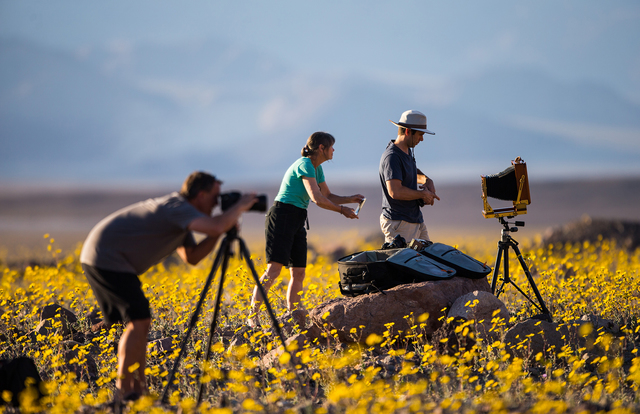Death Valley not likely to repeat last year’s bloom
The hopeful crowds might return to Death Valley this year, but the wildflowers probably won’t.
Experts say chances are fading for another epic bloom like the one that shattered visitation records in 2016.
The national park 50 miles west of Pahrump delivered the bad news in a Facebook post Wednesday.
“The results are in, and it’s not looking good,” the post read.
Late fall and early winter are pivotal times for flower germination, and Death Valley received far less rain in the past three months than it did over the same period in 2015.
As a result, “it’s unlikely that we’ll get another all-encompassing bloom like we saw last year,” said Linda Slater, the park’s chief of interpretation.
Record crowds turned out to experience that massive floral display, which transformed parts of the usually barren valley into a sea of yellow and green. Campgrounds were filled to capacity, and cars lined the park’s main roads in areas where the flowers were the thickest.
More than 209,000 people visited the park in March alone, eclipsing the previous single-month record of 178,000 set in April 1995.
When the Park Service releases its official stats in the coming weeks, 2016 will rank as the busiest year ever for Death Valley National Park. The record was already assured by the end of November when year-to-date visitation topped 1.25 million for the first time.
“We were swamped for months,” Slater said.
There is still some hope for this year’s bloom.
Jim Andre tracks desert flora as director of the Granite Mountains Desert Research Center in California.
He said significant amounts of soaking rain fell at the right time across parts of the Mojave Desert, but very little of that moisture made its way north of Interstate 15 and into Death Valley.
Right now, he predicts an average or below average year for wildflowers in the park, “but that could change” with some storm activity in the coming days.
What made last year’s bloom so unusual is that it came on the heels of a mostly dry winter in the region. Andre said most of the precipitation that triggered Death Valley’s explosion of color came from one localized storm cell that pummeled the park on Oct. 14, 2015, causing widespread flood damage.
This year’s wildflower show is likely to unfold farther to the south in places such as Mojave National Preserve, Joshua Tree National Park and California’s Anza-Borrego Desert State Park, Andre said.
“I think Joshua Tree is really going to go off this year, and that’s going to be the headline,” he said.
Contact Henry Brean at hbrean@reviewjournal.com. Follow @RefriedBrean on Twitter.
















